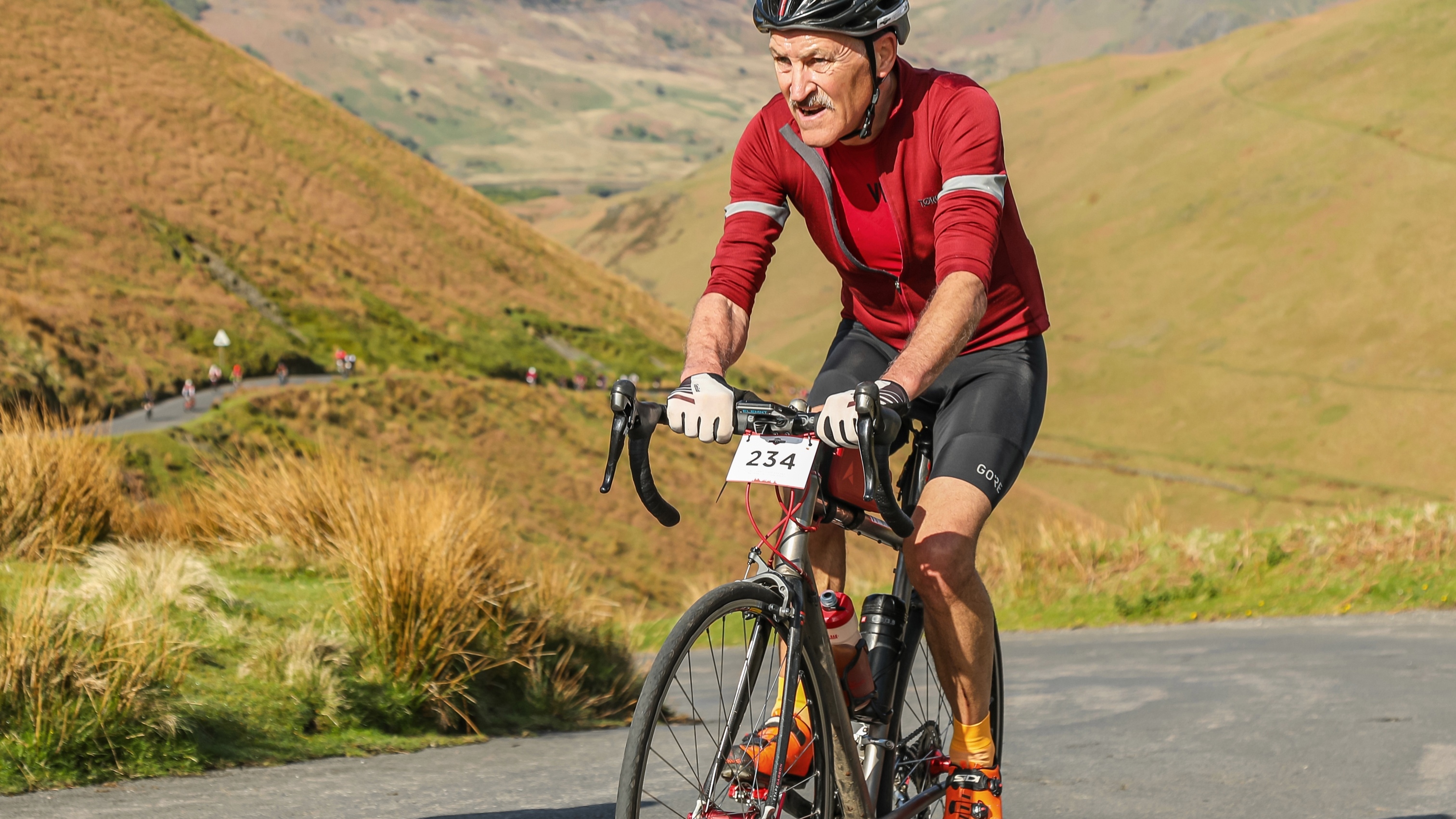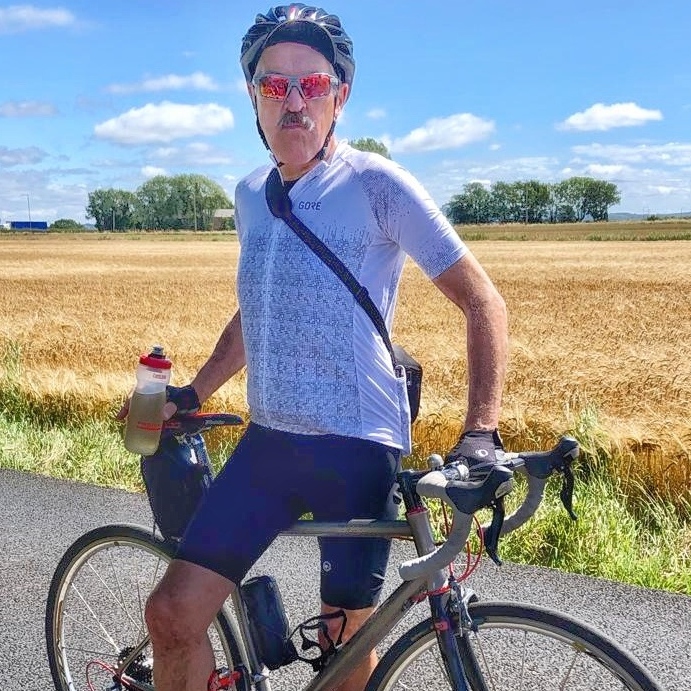
Richard Barrett is coming up to 71. Last year, he rode the challenging 112-mile Fred Whitton sportive in The Lake District in 2023 in just nine hours, and hopes to be the first person to complete it at 80. According to Barrett, the early years of retirement are a golden time for performance.
Barrett lives in North Wales with his partner Mari, also an accomplished cyclist.
“I never cycled competitively but I used to enjoy cycling in my teens. I got into the running boom in the 1980’s and I used to run the fells. I used to think nothing of running 60-70 miles a week and running marathons,” Barrett begins, “the end result was I knackered my knees! I’ve had three cartilage operations, which are pretty debilitating so I had to pack up running around the age of 43.”
Running can cause more muscle damage compared to cycling so this is a natural transition for many injured runners, “I got into cycling when my son started mountain biking but it was a bit frightening for me so I started cycle touring instead.” The similarities in fitness demands makes for an easy cross-over easy, “once you have fitness you don’t need to do much to maintain it.”

Being young on its own is no guarantee of superior performance, “in my group we are all probably late 60’s and 70’s, sometimes a younger person joins us and they aren’t as fit – they haven’t got the time to do the training.” A situation many in their thirties and forties with careers and young children will relate to. Barrett offers a ray of hope, “you have a golden window for the first few years of retirement when you have time on your hands and you are still young enough to progress. You can get ridiculously fit! For a while you actually improve your performance. I found I was faster than in my thirties and forties.”
We frequently talk about the importance of core and cross-training exercise, something that Barrett feels is even more important as we age, “as I get older I am realising I can’t just rely on cycling for fitness. I go to the gym and do high-quality work on the gym bike, then some weights and stretching to get that all round fitness that you need. We always try and do something every day, even if it is just lying on the carpet and stretching or 12 minutes of floor exercises like planks. You have to maintain suppleness and core strength, it is not enough to just sit on the bike and pedal.” If you aren’t following this advice already here are some home workouts to help you stay injury free.
Preparing for the Fred Whitton
“Weight is critical as you age,” says Barrett “I’m still the same weight as I was at university. To me it is one of the most important things. I lost a stone to do the Fred Whitton, it made a huge difference on the steep climbs because I wasn’t carrying an extra 5kg of dead weight. A you become older maintaining your weight is one of the biggest challenges. We follow some of Michael Mosley’s advice.”
Television presenter Dr.Michael Mosley brought the idea of intermittent fasting to the mainstream. A number of different research studies shows that intermittent fasting can improve insulin response, metabolic efficiency and increase longevity as well as help with weight loss or maintenance. Barrett follows the 5:2 approach where you consume very reduced calories on two days a week but with no calorie restriction on the other days. On non-fasting days followers eat a healthy, moderately low-carb Mediterranean style diet.
The Fred Whitton is widely acknowledged as one of the UK’s hardest sportives “I didn’t have an organised programme. I knew I could do the distance already but I did make sure I included some 130-140-mile rides.” What makes it hard is not the distance but the climbs with not just a few but many sections over 30%. Simon Warren, author of the 100 Greatest Cycling Climbs calls it “without doubt the toughest, baddest sportive in Britain”
“I’m pretty light, pretty fit but I did worry about the hills,” says Barrett, “I did most of my training on a gravel bike which was heavier than the bike I rode on the day. I had a single ring with harder gearing for training. On the day I rode my titanium bike with a triple – 30t-34t.”
Riding a course for the first time can make some riders apprehensive, but Barrett found a novel way to familiarise himself with the route, “I found out that at my gym I could download GPX from Strava and plug them into the bike and practice on real routes. I uploaded all the Lake District climbs, I rode them many times in the gym before I arrived in the Lake District. It wasn’t perfect, the gym tech bikes would never go more than 15% but Hardknott is over 30%, but I had the mental preparation. I designed routes where I could do 6 or 7 major climbs in Clwydian Range in a 40-50-mile ride and did some of the hardest local climbs like Bwlch Penbarras.”
With the physical and mental preparation in place the next step was strategic goal setting “I used the VAM formula and applied it to each section of the route to give myself bench marks and ensure I was within the cut-offs. I carried a laminated spread sheet in my jersey pocket. By the time I got to the top of the first climb of the Kirkstone pass I was 20 mins up. By the time I got down to Patterdale I was 40 minutes up – I chucked the paper away!”
“There was some bits that were bloody hard, but there is great camaraderie. Compared with running a marathon I felt good when I finished. Cycling is low impact so I could get off the bike and walk up to the pub after. As a relatively young man I would run a marathon and not be able to walk for 36 hours.”
Looking to the Future
Each decade brings new challenges, for now Barrett’s goal is to continue being able to enjoy cycling, “the next few years will be interesting to understand how much more effort we have to put in to maintain our fitness and what we may need to change. Hopefully we will avoid the drawn-out illnesses that can make old-age slow and painful. If you are fit you can get over traumas much quicker. I had a dynamic hip screw fitted and I was back on the bike after 12 weeks.”
While Barrett says he is not competitive and has never raced he still monitors his fitness,
“I like to use Strava and see how I compare to my peers. My goal this year is to do a set of intervals on the bike and average over 220 watts – it will be a way for me to see that I am improving or at least maintaining fitness.”
And will he be back for another crack? “I think there were 8 riders over 70 when I rode the Whitton, I hope do it again when I’m 80!”







